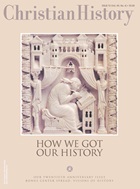The idea of Christendom, a domain where Christian politics and ecclesiology entwined, captivated the medieval imagination. Yet Augustine, whose thought (especially as expounded in his massive City of God) dominated the Middle Ages, never advocated such a system. Orosius, one of his students, did.
When Augustine began work on City of God, in 412, Rome was suffering under its first hostile occupation in centuries. Some disillusioned Roman citizens blamed Christians and their God, who seemed less able to defend the city than the old pagan gods had been. Augustine refutes this claim in City of God, especially the first five books.
The invasion of Rome drove many citizens to seek refuge in comparatively calm northern Africa, among them a young scholar named Orosius. Augustine welcomed him, describing him in a letter as a "young man … who is in the bond of the Catholic peace a brother, in the point of age a son, and in honor a fellow presbyter—a man of quick understanding, ready speech, and burning zeal, desiring to be in the Lord's house a vessel rendering useful service."
Orosius stayed with Augustine for about a year. Augustine was at the time busy working on City of God, combating the Pelagian heresy, and leading a large congregation. These duties left him no time to write a detailed, direct attack (beyond book three of City of God) on pagans and their nostalgia for a golden age before the rise of Christianity. So, according to Orosius, Augustine asked his protégé to mount the assault:
"You [Augustine] bade me, therefore, discover from all the available data of histories and annals whatever instances past ages have afforded of the burdens of war, the ravages of disease, the horrors of famine, of terrible earthquakes, extraordinary floods, dreadful eruptions of fire, thunderbolts and hailstorms, and also instances of the cruel miseries caused by parricides [familial murders] and disgusting crimes."
As requested, Orosius described plenty of burdens, ravages, and horrors in his Seven Books of History Against the Pagans. But he also not-so-subtly deviated from his mentor's view of political history. In earthly governments, where Augustine saw a gray mixture of human impurities and God's holiness, Orosius found evil blackness and holy light. Christian Rome, later revived as Christendom and the Holy Roman Empire, basked in the latter.
Just another city
Augustine was not so enamored with Rome. Though he did consider it the pinnacle of civilization to date, he did not believe that perfection could be reached this side of heaven—certainly not in Rome.
In book five of City of God, Augustine demolishes Roman ideas of glory:
"As far as I can see, the distinction between victors and vanquished has not the slightest importance for security, for moral standards, or even for human dignity. It is merely a matter of the arrogance of human glory, the coin in which these men 'received their reward,' who were on fire with unlimited lust for glory, and waged their wars of burning fury.
"Is it the case that the conqueror's lands are exempt from taxes? Have the victors access to knowledge forbidden to the others? Are there not many senators in other lands, who do not know Rome even by sight? Take away national complacency, and what are all men but simply men? If the perverse standards of the world would allow men to receive honors proportional to their deserts, even so the honor of men should not be accounted an important matter; smoke has no weight. …
"That City [heaven], in which it has been promised that we shall reign, differs from this earthly city as widely as the sky from the earth, life eternal from temporal joy, substantial glory from empty praises, the society of angels from the society of men, the light of the Maker of the sun and moon from the light of the sun and moon."
In the same book, Augustine also rejects the notion that God's favor guarantees a society's success, or that temporal success can be interpreted as a clear sign of divine approval:
"[W]e must ascribe to the true God alone the power to grant kingdoms and empires. He it is who gives happiness in the kingdom of heaven only to the good, but grants earthly kingdoms both to the good and to the evil, in accordance with his pleasure, which can never be unjust.
"We have already said something on this matter, as far as he has willed to make it plain to us. But to examine the secrets of men's hearts and to decide with clear judgment on the varying merits of human kingdoms—this would be a heavy task for us men, a task indeed far beyond our powers. …
"This is true also in respect of individual men. The same God gave power to Marius and to Gaius Caesar, to Augustus and to Nero, to the Vespasians, father and son, the most attractive emperors, as well as to Domitian, the most ruthless tyrant; and (we need not run through the whole list) the same God gave the throne to Constantine the Christian, and also to Julian the Apostate. …
"It is clear that God, the one true God, rules and guides these events, according to his pleasure. If God's reasons are inscrutable, does that mean that they are unjust?"
The most Christian empire
Whatever Orosius learned from Augustine, it did not include Augustine's ambivalence about earthly principalities. Orosius gushed about Rome, even suggesting, in his sixth book, that the city's history was a crucial part of God's plan for salvation:
"Now this one true God, on Whom, as we said, all schools agree even though differing in their interpretations, this God, Who changes kingdoms, orders the times, and also punishes sin, has chosen the weak of the world to confound the mighty and has laid the foundation of the Roman Empire by choosing a shepherd of the humblest station.
"After this empire had prospered for many years under kings and consuls and had gained the mastery of Asia, Africa, and Europe, He conferred all things by His decree upon a single emperor, who was preeminent in power and mercy. Under this emperor, to whom almost all nations rendered respect and due honor with mingled love and fear, the true God, Who was worshiped with scrupulous observance of rites by those who did not know Him, opened that great fountainhead of His knowledge.
"For the purpose of teaching men more quickly through a man, He sent His Son to work miracles that surpassed man's power and to refute the demons, whom some had thought to be gods, in order that those very men who had not believed in Him as a man should believe in His works as of God. He did this also that the glory of the new name and the swift report of the promised salvation might spread abroad quickly and without hindrance in the midst of the state of great tranquillity and universal peace that prevailed and also that His disciples, as they passed through different nations and freely offered the gifts of salvation to all, might have security and liberty to go about and speak as Roman citizens among Roman citizens."
Given the difficulties Rome faced during his lifetime, Orosius could not pretend that nothing bad ever happened in the empire. But instead of attributing these hardships to the fallenness of the world and the inscrutability of God's ways, as Augustine did, Orosius presents calamities as aberrations in which God's purposes are nonetheless clear and his mercy never far behind.
For example, Orosius states that Alaric's invasion of Rome in 410 was "due to the wrath of God rather than to the bravery of the enemy." The invasion caused destruction, but also good, for "[i]n the sacking of the City the trumpet of salvation sounded far and wide." Moreover, the destruction was minor: "[The Goths] had, it is true, burned a certain number of buildings, but even this fire was not so great as that which had been caused by accident [during Nero's reign]."
Throughout his Seven Books, Orosius comes across as a realist—more interested in political realities than in otherworldly speculations. Near the end of the work, he writes, "In view of these things I am ready to allow Christian times to be blamed as much as you please, if you can only point to any equally fortunate period from the foundation of the world to the present day." Because Orosius compares Rome to its imperial peers, and not to the heavenly city that figured so prominently in Augustine's thought, Rome appears to be the best of all possible worlds.
No record remains of what Augustine thought of his pupil's composition. It is hard to believe he would have given it high marks. But heads of later Christian states loved Orosius's blend of providentialism and politics. Ninth-century West Saxon King Alfred the Great even translated Orosius's Seven Books into Anglo-Saxon, then grafted on recent accounts from northern Europe, indicating that God's hand continued to guide righteous kingdoms. In some ways, apologists for "Christian America" (or any other state) continue the project.
Elesha Coffman is managing editor of Christian History.
Copyright © 2001 by the author or Christianity Today/Christian History magazine.
Click here for reprint information on Christian History.

Support Our Work
Subscribe to CT for less than $4.25/month




























